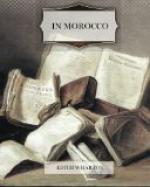[Footnote A: The high plateau-and-hill formation between Tangier and Fez.]
Range after range these translucent hills rose before us, all around the solitude was complete. Village life, and even tent life, naturally gathers about a river-bank or a spring; and the waste we were crossing was of waterless sand bound together by a loose desert growth. Only an abandoned well-curb here and there cast its blue shadow on the yellow bled, or a saint’s tomb hung like a bubble between sky and sand. The light had the preternatural purity which gives a foretaste of mirage: it was the light in which magic becomes real, and which helps to understand how, to people living in such an atmosphere, the boundary between fact and dream perpetually fluctuates.
The sand was scored with tracks and ruts innumerable, for the road between Rabat and Fez is travelled not only by French government motors but by native caravans and trains of pilgrims to and from the sacred city of Moulay Idriss, the founder of the Idrissite dynasty, whose tomb is in the Zerhoun, the mountain ridge above Volubilis. To untrained eyes it was impossible to guess which of the trails one ought to follow; and without much surprise we suddenly found the motor stopping, while its wheels spun round vainly in the loose sand.
The military chauffeur was not surprised either; nor was Captain de M., the French staff-officer who accompanied us.
“It often happens just here,” they admitted philosophically. “When the General goes to Meknez he is always followed by a number of motors, so that if his own is stuck he may go on in another.”
This was interesting to know, but not particularly helpful, as the General and his motors were not travelling our way that morning. Nor was any one else, apparently. It is curious how quickly the bled empties itself to the horizon if one happens to have an accident in it! But we had learned our lesson between Tangier and Rabat, and were able to produce a fair imitation of the fatalistic smile of the country.
The officer remarked cheerfully that somebody might turn up, and we all sat down in the bled.
A Berber woman, cropping up from nowhere, came and sat beside us. She had the thin suntanned face of her kind, brilliant eyes touched with khol, high cheek-bones, and the exceedingly short upper lip which gives such charm to the smile of the young nomad women. Her dress was the usual faded cotton shift, hooked on the shoulders with brass or silver clasps (still the antique fibulae), and wound about with a vague drapery in whose folds a brown baby wriggled.
The coolness of dawn had vanished and the sun beat down from a fierce sky. The village on the railway was too far off to be reached on foot, and there were probably no mules there to spare. Nearer at hand there was no sign of help, not a fortified farm, or even a circle of nomad tents. It was the unadulterated desert—and we waited.




